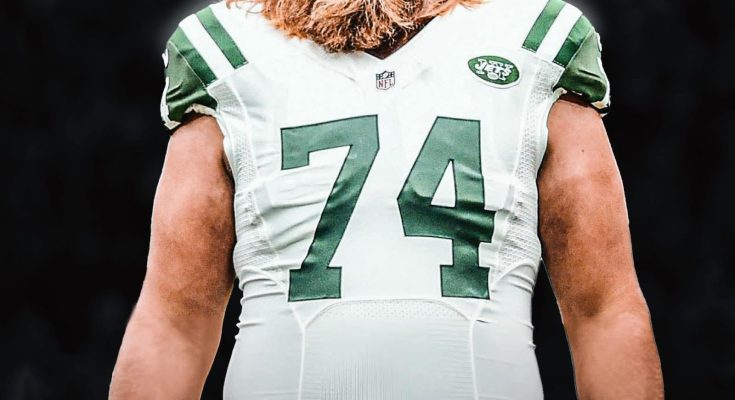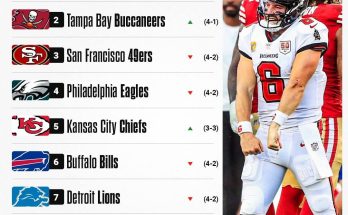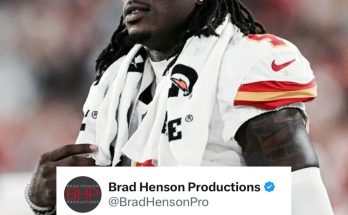Former New York Jets center Nick Mangold, a seven-time Pro Bowler and one of the most respected figures in recent NFL history, has publicly shared a deeply personal and urgent message with his fans and communities. In an emotional and candid statement, Mangold revealed that he has been diagnosed with chronic kidney disease and is currently undergoing dialysis treatment as he awaits a life-saving kidney transplant. His appeal was not only a brave step forward in his health journey but also a heartfelt call to the Jets and Ohio State communities for help at a time when he needs it most.
Mangold shared that his condition is the result of a genetic defect that he was first diagnosed with back in 2006. At the time, he was still early in his professional football career, and though the diagnosis was a heavy burden, it was something he managed privately while continuing to perform at an elite level in one of the most physically demanding positions in sports. Playing center in the NFL requires tremendous strength, precision, and endurance—not to mention a level of toughness that few can sustain. That Mangold managed to maintain such high-level play for over a decade while dealing with an underlying medical condition is a testament to both his physical resilience and mental fortitude.
Now, nearly two decades after that initial diagnosis, the long-anticipated reality of living with chronic kidney disease has arrived in full force. Mangold explained that the past summer was particularly difficult for him health-wise, ultimately leading to the need for dialysis. Dialysis is a grueling process that substitutes for kidney function by removing waste and excess fluid from the blood—a process that can dramatically alter a person’s lifestyle, energy levels, and overall well-being. It is not a cure, but a necessary bridge to transplantation, which remains the only long-term solution for patients with end-stage kidney failure.
Perhaps the most moving part of Mangold’s announcement is the vulnerability with which he shared his current situation. He admitted that he always knew this day would come, given the nature of his diagnosis, but he had hoped that it would be many years down the line. “I thought I would have had more time,” he wrote, capturing a sentiment familiar to many people facing the slow progression of chronic illness. There is always a sense of borrowed time—an optimism that, even with the knowledge of what lies ahead, maybe the future will hold off just a little longer. For Mangold, that time has now arrived, and he is facing it head-on with the same determination and grit that he brought to the football field.
What makes his situation even more complex is that, despite having a large and supportive family, none are currently able to donate a kidney. In many cases, family members are the first option for kidney donations, especially because of the higher likelihood of compatibility. The fact that Mangold’s relatives are unable to help due to medical or other reasons adds another emotional layer to his journey. It underscores how deeply personal this request is—not just a medical plea, but an act of immense humility and trust in the goodness of others.
In reaching out, Mangold specifically appealed to two communities that have played central roles in his life and career: the New York Jets fan base and the Ohio State University family. As a standout player at Ohio State before becoming the anchor of the Jets’ offensive line, Mangold has long been a beloved figure in both circles. He represented everything fans admire in an athlete—loyalty, toughness, humility, and leadership. Now, he is asking those same people to consider stepping up in a different kind of way. Not by cheering from the stands or buying jerseys, but by potentially becoming a living donor—a heroic and selfless act that could save his life.
To help facilitate this process, Mangold provided detailed instructions for those willing to explore the possibility of kidney donation. He directed potential donors to the Columbia University Kidney Transplant website, a trusted and highly reputable medical institution, and asked them to use his full name, Nicholas Mangold, along with his birthdate, January 13, 1984, when filling out the donor interest form. He emphasized the importance of blood type in the donation process, specifically noting that he needs a donor with type O blood. Type O is considered a universal donor in many medical contexts, but for transplant recipients who are type O themselves, finding a compatible kidney is often more challenging, as they can only receive organs from other type O donors.
The process of becoming a living kidney donor is not a simple one, and Mangold was clear in expressing his gratitude to anyone even considering such a step. The screening process involves multiple stages, including blood tests, physical evaluations, and psychological assessments to ensure the donor is healthy enough for surgery and emotionally prepared for the implications of their decision. For those who ultimately match and proceed with donation, the surgery is typically done laparoscopically, and while recovery can vary, many donors return to their normal lives within weeks.
Yet what cannot be overstated is the impact of such a donation. For recipients like Mangold, a successful kidney transplant can be life-altering. It can mean freedom from dialysis, a return to a more normal lifestyle, improved energy levels, and significantly increased life expectancy. It can also mean the chance to spend more quality time with loved ones, pursue passions, and continue giving back to the community in meaningful ways. For a person who has given so much of himself to fans and teammates alike, this is now a moment for others to give back.
Mangold’s story is also a reminder of how health challenges can affect anyone, regardless of their physical strength, fame, or past accomplishments. Chronic kidney disease is a condition that affects millions of people, many of whom live in silence or without access to the kind of support networks that someone like Mangold might have. By going public with his diagnosis and treatment, he is not only seeking help for himself but also raising awareness about a disease that too often goes unnoticed until it reaches a critical stage. His openness can inspire conversations, encourage earlier testing and diagnosis for others at risk, and highlight the importance of organ donation on a national level.
In many ways, Mangold’s journey parallels the arc of many athletes who transition from the bright lights of the stadium to the quieter, more private battles of post-retirement life. Injuries, chronic health conditions, and the psychological toll of leaving a life of routine, camaraderie, and purpose can weigh heavily. Yet in sharing his vulnerability, Mangold is continuing to lead—this time not with brute force or sharp football intellect, but with honesty, courage, and an appeal to community.
The football world, and the broader public, now has a chance to respond. Whether or not individuals are in a position to donate, Mangold’s message calls for empathy, support, and action. For some, it might mean checking to see if they are a potential match. For others, it could mean spreading the word, raising awareness, or simply sending words of encouragement to someone who has brought so much pride to his teams and fans.
Nick Mangold was known throughout his career as a protector—the player who stood between the quarterback and danger, the one who took on the biggest defensive threats with calm and control. Now, in a moment of need, he is asking for protection of a different kind. He is asking for help to extend his life, to continue being a father, a friend, a brother, and a contributor to the communities he loves. It’s a powerful role reversal that shines a light on what truly matters beyond the game.
For those with type O blood and a willingness to consider living kidney donation, this could be a rare opportunity to directly change—perhaps even save—the life of someone who spent years giving his all for the benefit of others. Mangold’s legacy on the field is already secure. What happens next will depend on the strength and compassion of the community he helped build.


